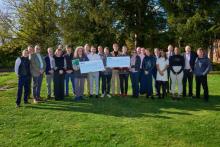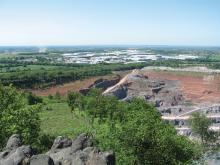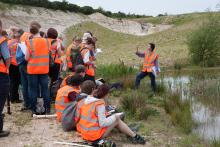A biodiversity research project carried out by a team from Anglia Ruskin University, Cambridge, eastern England, has won the UK section of the Quarry Life Awards.
The project, which looked at insect biodiversity in grasslands at Needingworth sand and gravel quarry in County Cambridgeshire, claimed the €5,000 (£4,000) first prize at an awards ceremony held at The Forest Centre in Marston Moretaine, County Bedfordshire.
The Quarry Life Awards is an international competition organised by
The Needingworth study, led by Dr Alvin Helden of Anglia Ruskin’s Department of Life Sciences, analysed invertebrate species richness in restored grassland. It concluded that setting aside ungrazed areas is a valuable means of enhancing invertebrate biodiversity.
The judging panel, which included representatives from
Patrick O’Shea, chief executive officer of Hanson UK, who presented the awards, said: “We recognise that our sites are a valuable natural resource and we are committed to maximising the benefits they can provide for biodiversity.
“The Quarry Life Awards aim to enhance the important link between scientific research and mineral extraction. The winning project provides valuable information that can be used in the restoration of many other sites.”
Dr Helden added: “Setting aside ungrazed areas has clearly been effective in encouraging insect populations on the restored parts of Needingworth, with our study showing that on average, insect populations are 15 per cent higher.
“The discovery of several very rare species of leafhoppers and planthoppers shows that the site has an incredible biodiversity, and not just for the wetland species for which it was primarily created.”
The UK winners were:
First place:
Grassland Insects after gravel extraction: Investigation into insect biodiversity of grasslands surrounding the reed bed restoration at Needingworth Quarry, Anglia Ruskin University.
Second place:
The feasibility of biodiversity enhancements in woodland ground flora around Whatley quarry, Bath Spa University.
Third place:
Life in new lakes: Investigation into the potential of new lakes at Barton quarry as aquatic biodiversity hotspots, Loughborough University and University College, London.
Highly commended:
The value of quarry restoration at Whatley quarry to local ecological networks, University of the West of England.
Winners of the international competition will be announced in Prague, Czech Republic, on 10 December.







